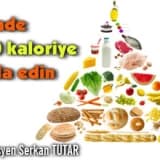Elıt Sporcularda Beslenme ve Uyku Arasındak İlişki: Bir Pilot Çalışma ̇

Sleep plays a critical role in the regulation of both physical and cognitive functions and is essential for optimal performance in athletes. Maximizing the performance of elite athletes, as well as optimizing their physical and mental health, has become an increasingly prominent area of interest, particularly in the study of fundamental lifestyle factors such as sleep and nutrition (Halson, 2014). Adequate and quality sleep is crucial for muscle repair, immune function, and overall recovery processes. Sleep deprivation in athletes has been shown to lead to performance declines, increased injury risk, and impairments in cognitive functions (Milewski et al., 2014).
Nutrition also plays a significant role in athlete health and performance. Proper nutrient intake is necessary to maintain energy balance, muscle protein synthesis, and recovery processes (Kerksick et al., 2018). The literature contains studies that investigate the associations between nutrient intake and sleep quality. For example, some research suggests that protein and carbohydrate intake can positively influence sleep latency and sleep efficiency (Lund et al., 2010). Specifically, amino acids like tryptophan have been noted to improve sleep quality by enhancing melatonin synthesis (Peuhkuri et al., 2012). Further, while fat intake among male Australian footballers was not associated with sleep (Falkenberg et al., 2021), high fat intakes in non-athletes have been associated with reduced sleep efficiency and duration (Crispim et al., 2011; Grandner Kripke et al., 2010). A recent review focusing on the practical applications of sleep related nutrition in athletes underscores the significance of micronutrients, particularly magnesium. (Doherty et al., 2023).
The influence of magnesium on athletes' sleep merits thorough investigation, as it is postulated to enhance melatonin secretion and function as a GABA agonist, the primary inhibitory neurotransmitter within the central nervous system (Peuhkuri et al., 2012). However, data are needed on the potential relationship between macro and micro nutrient intake and sleep in elite athletes.
Studies directly examining the relationship between nutrient intake and sleep quality in elite athletes are limited (Condo et al., 2022; Falkenberg et al., 2021; Hoshino et al., 2022; Moss et al., 2022) with notable gaps in the literature. Existing researches predominantly focus on the general population or amateur athletes, while studies on elite athletes are fewer and often methodologically flawed (Simpson et al., 2017). Consequently, more in-depth studies on the relationship between nutrient intake and sleep quality in elite athletes are necessary. This study aims to address this gap by evaluating the relationship between nutrient intake and sleep quality in elite athletes using a cross-sectional approach, based on the hypothesis that poor sleep quality in elite athletes is associated with low nutrient intake.
METHODS
Participants: A power analysis was performed using G*Power to determine the statistical power of the study. The sample size included in the study was calculated to reach 80% statistical power, taking into account the predetermined effect size (Cohen's d: 0.8) and the accepted alpha level (α = 0.05)(Lakens, 2013). According to this analysis, at least 107 participants were required. A total of 124 athletes from five sports (swimming, canoeing, archery, volleyball and taekwondo) were included in the cross-sectional study. Following Swann et al., elite athletes were defined as individuals who (a) are presently benefiting from support or funding via the international carding scheme, and/or (b) are part of a national or professional team, or are included in a recruitment/academy squad, and/or (c) hold a national ranking in their respective sport (Swann et al., 2015). All athletes competed at the national level. Individuals younger than 18 years old and those diagnosed with sleep disorders were excluded from the study. A self- administered questionnaire was administered.
This study was approved by Baskent University Institutional Review Board and Ethics Committee (Date: June, 15, 2022, Protocol no: E-94603339-604.01.02-138333). The study complies with the Helsinki Declaration. A comprehensive explanation of the study details was provided to all participants, and written informed consent was acquired from each of them.
Data Collection: The study period was between May 2023 and June 2023 and was conducted during the regular training season. Questionnaire data were obtained on weekday training days. Body weight (kg), and body fat (%) were measured using a body composition monitor (MC780, TANITA, Tokyo, Japan). The body mass index (BMI) was determined by dividing the body weight (in kilograms) by the square of the height (in meters).
Data collection tools included a demographic information form, a 24-hour food consumption record, and the Richard-Campbell Sleep Scale (RCSQ). Data were collected in the morning and the previous day's night sleep and nutrition were recorded.
The Turkish validity and reliability study of the RCSQ developed by Richards in 1987 was conducted by Karaman Özlü and Özer in 2015. The Cronbach's α values of the scales were found to be 0.82 and 0.91, (respectively Ozlu & Ozer, 2015; Richards, 1987). Each item on the six-item scale, which assesses the depth of night sleep, time to fall asleep, frequency of awakenings, duration of wakefulness upon awakening, sleep quality, and environmental noise level, is rated on a visual analog scale from 0 mm to 100 mm. The total score is derived from five items, excluding the sixth item that measures environmental noise level. A total RCSQ score of ≥50 was used to define good sleep. Participants with total RCSQ score
Participants' daily energy and food intakes were assessed using a 24-hour recall dietary record. In order to accurately determine the amount of food consumed, measuring cups such as water glasses, tea glasses, teaspoons, dessert spoons, tablespoons, serving spoons, ladles and bowls are used, and cooking methods (baked, grilled, boiled, fried, with meat, etc.) are used to accurately identify the consumed foods. Daily energy, macronutrients and micronutrients were calculated using the Nutritional Information System 8.1 software (BeBIS 2006). Glycemic index values of participants' last meals were sourced from University of Sydney’s database (Sydney University Glycemic Index Research Service, 2007: www.glycemicindex.com).
Data Analysis: Upon analyzing the item analysis results of the sleep quality scale, it was found that the corrected item-total correlation values ranged from 0.475 to 0.627, and the factor loadings ranged from 0.639 to 0.798. The independent samples t-test conducted to evaluate the differences between the top and bottom 27% groups revealed statistically significant differences between these groups. Consequently, the Cronbach's alpha internal consistency coefficient was calculated as 0.770.
Based on the RCSQ scores, participants were categorized into two groups: good sleepers and poor sleepers. The nutrient intakes and subject characteristics of these two groups were then compared. Additionally, athletes were divided according to type of sports and their sleep scores were compared. Shapiro–Wilk test confirmed the data normality. Comparisons were made using one-way ANOVA analysis. Data are presented as mean ± standard deviation. For all analyses, p
A total of 124 participants were initially recruited for the study. However, incomplete responses were excluded, resulting in a final sample size of 115 participants. Of the sample, 37 (24.7%) were female and 78 (75.3%) were male. The primary attributes of the participants are shown in Table 1. The participant’s age was 19.7 ± 3.6 years, height was 175.3 ± 8.8 cm, weight was 68.7 ± 10.9 kg, BMI was 22.3 ± 2.3 (kg/m2), and body fat percentage was 16.8% ± 5.4%. The duration of sleep was 7.5 ± 0.9 h.
There were 104 participants (90.4%) who were in the competition season. None of the participants had any chronic diseases. Only seven participants consumed alcohol, and they reported consuming it once a week.
RCSQ
Total (n=115) Poor sleeper (n=29) Good sleeper (n=86) p
Age (years) 19.7 ± 3.6 19.4 ± 3.3 19.8 ± 3.7 0.59 Height (cm) 175.3 ± 8.8 174.1 ± 10.0 175.6 ±8.3 0.42 Weight (kg) 68.7 ± 10.9 67.6 ± 10.6 69.0 ± 11.0 0.54 BMI (kg / m2) 22.3 ± 2.7 22.2 ± 2.2 22.3 ± 2.9 0.83 Body Fat (%) 16.8 ± 5.4 18.0 ± 6.7 16.4 ± 4.8 0.17 Sleep duration (hours) 7.50 ± 0.9 7.4 ± 6.9 7.5 ± 0.8 0.79 Training (hours/week) 20.3 ± 6.4 20.7 ± 6.9 20.1 ± 6.2 0.65 BMI: Body mass index, *p
The RCSQ scores of the participants are shown in Table 2. The overall RCSQ score was 62.55 ± 22.49. 29 participants (25.2%) had poor sleep quality, while 86 participants (74.8%) had good sleep quality. A comparison of sleep scores according to sport type revealed no significant differences in total RCSQ scores (p > 0.05). However, the canoeing group exhibited a lower score than all other groups in the sleep quality score (p
Table 2
The RCSQ Scores of the Subjects
Swimming (n = 58)
Canoeing (n = 11)
Archery (n = 17)
Taekwondo (n=18)
Volleybal (n = 11)
Total
(n =115) p
Sleep duration 7.59 ± 0.80 7.54 ± 1.03 7.58 ± 1.06 7.11 ± 1.02 7.36 ± 1.02 7.50 ± 0.92 0.34 RCSQ measures
Sleep depth 62.06 ± 18.33 50.90 ± 35.34 65.29 ± 24.26 66.11 ± 21.99 70.90 ± 23.00 62.95 ± 22.39 0.26 Sleep latency 62.41 ± 25.97 43.63 ± 35.85 65.29 ± 29.39 62.77 ± 32.50 71.81 ± 29.93 62.00 ± 29.17 0.22 Awakenings 65.34 ± 33.67 53.63 ± 42.01 72.35 ± 38.00 58.33 ± 35.18 73.63 ± 38.80 64.95 ± 35.72 0.54
Returning to sleep
63.79 ± 36.60 61.81 ± 33.11 69.41 ± 36.30 52.77 ± 33.39 64.54 ± 42.51 62.78 ± 36.04 0.73
Sleep quality 69.13 ± 28.05 47.27 ± 39.51* 82.94 ± 17.94 71.11 ± 22.46 72.72 ± 31.33 69.73 ± 28.51 0.02
Total RCSQ score
63.65 ± 20.68 53.09 ± 25.38 66.70 ± 25.22 63.44 ± 25.24 58.36 ± 20.68 62.55 ± 22.49 0.55
Noise 70.34 ± 36.60 75.45 ± 33.87 84.11 ± 23.46 70.00 ± 34.64 65.45 ± 36.70 72.34 ± 34.26 0.59 * p
The balance of energy-producing nutrients was 20% protein, 41% fat, and 39% carbohydrate. Nutrient intake is shown in Table 3. Energy intake was 2063 ± 1003 kcal. The RCSQ scores were used to compare the intake of nutrients in the poor sleeper and good sleeper groups. Good sleeper group had higher energy (kcal), protein (g/kg and g) and tryptophan (g/kg and g) intakes (p 0.05).
RCSQ
Total (n=115) Poor sleeper (n=29) Good sleeper (n=86) p
Energy (kcal / kg BM) 30.59 ± 15.05 26.74±13.20 31.89±15.48 0.11 Energy (kcal) 2063.56 ± 1003.70 1746.35±722.20 2170.52 ± 1064±62 0.04 Protein (g / kg BM) 1.54 ± 0.83 1.27±0.65 1.63 ± 0.87 0.04 Protein (g) 105.39 ± 57.12 84.36±39.63 112.49 ± 60.47 0.02 Carbohydrate (g / kg BM) 2.90 ± 1.65 2.66±1.58 2.99±1.67 0.35 Carbohydrate (g) 195.19 ± 109.95 173.45 ± 94.26 202.52 ± 114.33 0.22 Fat (g/kg BM) 1.41 ± 0.82 1.22 ±0.75 1.48 ± 0.84 0.06 Fat (g) 95.68 ± 54.07 79.45 ± 41.70 101.16 ± 56.82 0.14 Tryptophan (mg/kg BM) 18.67 ± 9.96 15.57 ±7.43 19.72 ± 10.52 0.05 Tryptophan (mg) 1275.23 ± 688.38 1032.75 ±447.12 1356.99 ±736.79 0.02 Magnesium (mg / kg BM) 5.26 ± 3.62 4.33 ±3.06 5.57 ±3.76 0.11 Magnesium (mg) 355.69 ± 243.86 284.23 ± 187.50 379.78 ± 256.61 0.68 Caffeine (mg) 88.72 ± 48.69 76.41 ± 44.00 92.88 ±49.72 0.11 Water (ml) 3533.47 ± 4557.73 4403.2 ± 1831.80 3240.20 ± 1349.36 0.23 Glycemic index of last meal (score) 63.17±18.24 62.49 ± 18.17 63.39 ± 18.36 0.81 BM: Body Mass, *p
DISCUSSION
This study aimed to assess sleep quality and dietary intake among elite athletes. To the best of our knowledge, it is the first study in Turkey to examine the relationship between sleep quality and nutrient intake across different sports among elite athletes. The primary findings indicated that the energy, protein and trytophan intakes of good sleepers were higher than those of poor sleepers.
Several studies have examined the subjective sleep quality scores of elite athletes and have found evidence of sleep disturbance and poor sleep quality in this population. One systematic review (Gupta et al., 2016) reported that approximately one-third to one-half of elite athletes are classified as 'poor sleepers'. In our study, approximately 25% of all athletes were classified as ‘poor’ sleepers. When the athletes were categorised according to branches, the total sleep scale scores were similar. However, the sleep quality score of the canoeing branch was lower than that of the other branches. This difference may be due to the early training hours and high weekly training hours specific to this branch. Sargent et al. (2014), examined the effects of training programmes on sleep and highlighted the effects of the timing of training sessions on sleep. In our study, there were participants from the canoeing branch who trained very early in the morning. This difference may have affected the sleep quality perceived by the athletes. Consequently, these effects warrant further investigation in future studies.
Participants in this study had an average sleep duration of 7.5 hours. Teece et al. (2023), reported similar results, while other studies with elite athletes (Lastella et al. 2015; Sargent, et al., 2014) reported sleep duration
et al., reviewed the literature on sleep hygiene to optimise recovery in athletes and suggested that increasing sleep duration by 2 hours, with a target of up to 9 hours in elite athletes, may be beneficial to optimise recovery. However, it's important to recognize that a universal sleep recommendation (7-9 hours) may not be suitable for optimizing an athlete's performance and well-being (Vitale et al., 2019). An individualized approach, which considers perceived sleep requirements, should be implemented.
The relationship between daily energy intake and sleep in elite athletes has been the subject of limited research (Falkenberg, et al., 2021; Saidi, et al., 2024). Insufficient energy intake diminishes sleep quality, which is suggested to have impacted the findings of the study (Halson, 2014). The caloric needs of athletes performing moderate intensity training or high volume intensive training are reported to be 40-70 kcal/kg/day (Kerksick, et al., 2018). In our study, the energy intake of the athletes was 2063 calories and 30.59 ± 15.05 kcal/kg (lower of recommended) and poor sleepers had a lower energy intake. These findings support a similar study that was previously carried out on elite athletes (Halson, 2014).
Protein and tryptophan consumption have been linked to sleep quality in various studies. (Ferguson et al., 2022; Kautz et al., 2021; Moss et al., 2022; Santos et al., 2022). It has been demonstrated that improvements in sleep parameters, including increased sleep time and efficiency, and decreased sleep latency, can be achieved following the consumption of tryptophan; an aminoacid present in foods such as milk (Ferguson et al., 2022). Conversely, sleep quality has been shown to decrease with tryptophan depletion. The mechanism underlying this process involves tryptophan competing with other large neutral amino acids- such as valine, leucine, isoleucine, tyrosine and phenylalanine- for transport across the blood brain barrier. Once across the barrier, tryptophan is converted into serotonin, which then serves as a precursor for melatonin, a hormone that promotes sleep (Duan, et al., 2018). The current recommended protein intake for athletes is 1.2-2.0 g/kg BM per day (Kerksick, et al., 2018). In terms of the necessary dose of tryptophan, it has been revealed that 1 g is sufficient to improve both the quantity and the quality of sleep (Silber & Schmitt, 2010). In our study, the protein intake of athletes was approximately 1.5 g/kg BM, and good sleepers had a higher protein intake (~1.6 g/kg BM) and tryptophan intake (~1350 mg). The results of this study showed that good sleepers had high protein and tryptophan intakes. This finding is consistent with the existing results in the literature. However, further experimental and longitudinal studies are needed to confirm the causality of these relationships. In future studies, a more detailed examination of the effects of different sources and intake times of protein and tryptophan on sleep quality may deepen the knowledge on this subject.
This study found no difference between good and poor sleepers in carbohydrate intake. Similarly, a study involving Australian male football players found no effect of daily carbohydrate intake on sleep outcomes (Falkenberg, et al., 2021). Conversely, in non-athletes, high carbohydrate diets were linked to improved sleep quality (Lindseth & Murray, 2016). The disparities in findings among studies may suggest that the timing of carbohydrate consumption influences sleep or that the effects on sleep are contingent upon the type or glycemic index of carbohydrates consumed. The proposed mechanism for enhancing sleep following a high glycemic index meal involves elevating the plasma tryptophan to large neutral amino acid (TRP/LNAA) ratio. One study found that a high- glycemic index meal consumed 4 hours before bedtime significantly reduced sleep onset latency by 48.6% compared to a low- glycemic index meal consumed 4 hours before bedtime, or 38.3% compared to the same meal consumed 1 hour before bedtime (Afaghi et al., 2007). In this study, the average glycemic index of the athletes' last meal was moderate and not associated with sleep quality. Further research into the optimal timing, amount and source of carbohydrate intake and its interaction with other macro- and micronutrients in an athletic population is needed to determine the effectiveness of carbohydrate on sleep.
The primary limitation of this study is that it was based on participants' self-reports of both their sleep patterns and dietary intake. As previously acknowledged, self-reported methods like questionnaires and journals are susceptible to inaccuracies in measurement and biases in recall (Lastella, et al., 2021). Athletes may tend to overestimate their sleep durations (Caia, et al., 2018). Nonetheless, self-report techniques are commonly utilized in athletic contexts due to their simplicity and cost-effectiveness in monitoring athletes, providing a reasonably comprehensive overview of the target population. Moreover, subjective sleep assessments often align with complaints and the pursuit of assistance (Dunican, et al., 2017). Future investigations exploring the potential impact of nutrition on enhancing athlete sleep should integrate both subjective and objective sleep measurement approaches. Another limitation is that stress and psychological factors were not evaluated in the study. The current limitations were identified during the pilot study of the research. These findings provide important findings that will shed light on future studies.
CONCLUSION
This research investigated the relationships between dietary intake and sleep quality among elite athletes from various sports disciplines. Data were gathered in-season, thus offering a real example of the interaction between nutrition and sleep during a crucial training period for these athletes. The results indicated a relationship between sleep quality and nutritional intake in elite athletes. However, further research is needed to investigate causality in this relationship. Future studies should aim to identify the effects of specific nutrient deficiencies on sleep quality and delve deeper into the interactions between sleep regulation and dietary strategies.


